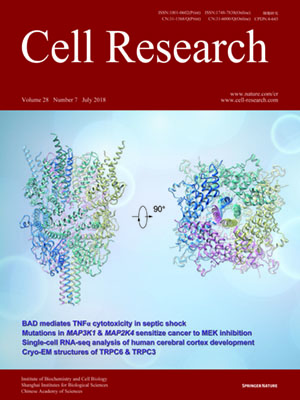
Volume 28, No 7, Jul 2018
ISSN: 1001-0602
EISSN: 1748-7838 2018
impact factor 17.848*
(Clarivate Analytics, 2019)
Volume 28 Issue 7, July 2018: 719-729 | Open Access
ORIGINAL ARTICLES
MAP3K1 and MAP2K4 mutations are associated with sensitivity to MEK inhibitors in multiple cancer models
Zheng Xue 1 , Daniel J. Vis 1 , Alejandra Bruna 2 , Tonci Sustic 1 , Sake van Wageningen 1 , Ankita Sati Batra 2 , Oscar M. Rueda 2 ,Evert Bosdriesz 1 , Carlos Caldas 2,3 , Lodewyk F. A. Wessels 1 and René Bernards 1
1 Division of Molecular Carcinogenesis, Oncode Institute, The Netherlands Cancer Institute, Plesmanlaan 121, Amsterdam 1066 CX, The Netherlands; 2Department of Oncology and Cancer Research UK Cambridge Institute, Li Ka Shing Centre, University of Cambridge, Cambridge CB2 0RE, UK and 3Cambridge Breast Unit, NIHR Cambridge Biomedical Research Centre and Cambridge Experimental Cancer Medicine Centre, Cambridge University Hospitals NHS Foundation Trust, Cambridge CB2 2QQ, UK
Correspondence: Correspondence: René Bernards (r.bernards@nki.nl)
Activation of the mitogen-activated protein kinase (MAPK) pathway is frequent in cancer. Drug development efforts have been focused on kinases in this pathway, most notably on RAF and MEK. We show here that MEK inhibition activates JNK-JUN signaling through suppression of DUSP4, leading to activation of HER Receptor Tyrosine Kinases. This stimulates the MAPK pathway in the presence of drug, thereby blunting the effect of MEK inhibition. Cancers that have lost MAP3K1 or MAP2K4 fail to activate JNK-JUN. Consequently, loss-of-function mutations in either MAP3K1 or MAP2K4 confer sensitivity to MEK inhibition by disabling JNK-JUN-mediated feedback loop upon MEK inhibition. In a panel of 168 Patient Derived Xenograft (PDX) tumors, MAP3K1 and MAP2K4 mutation status is a strong predictor of response to MEK inhibition. Our findings suggest that cancers having mutations in MAP3K1 or MAP2K4, which are frequent in tumors of breast, prostate and colon, may respond to MEK inhibitors. Our findings also suggest that MAP3K1 and MAP2K4 are potential drug targets in combination with MEK inhibitors, in spite of the fact that they are encoded by tumor suppressor genes.
https://doi.org/10.1038/s41422-018-0044-4
FULL TEXT | PDF
Browse 1545


